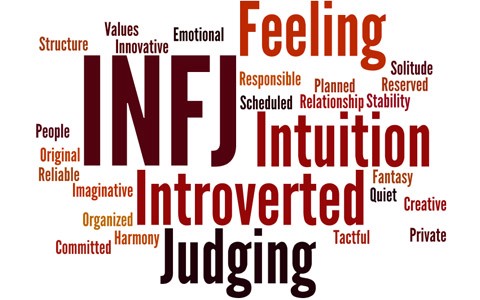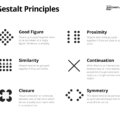The INFJ Personality Type
INFJs are creative nurturers with a strong sense of personal integrity and a drive to help others realize their potential. Creative and dedicated, they have a talent for helping others with original solutions to their personal challenges. The Counselor has a unique ability to intuit others’ emotions and motivations, and will often know how someone else is feeling before that person knows it himself. They trust their insights about others and have strong faith in their ability to read people. Although they are sensitive, they are also reserved; the INFJ is a private sort and is selective about sharing intimate thoughts and feelings.
What does INFJ stand for?
INFJ is one of the sixteen personality types created by Katharine Briggs and Isabel Myers. INFJ is an acronym for the personality traits of Introversion, iNtuition, Feeling, and Judging. The INFJ type is also called the “Counselor” and is described as idealistic, compassionate, and sensitive.
Each of the four letters of the INFJ code signifies a key personality trait of this type. INFJs are energized by time alone (Introverted), focus on ideas and concepts rather than facts and details (iNtuitive), make decisions based on feelings and values (Feeling), and prefer to be planned and organized rather than spontaneous and flexible (Judging).
INFJ Values and Motivations
INFJs are guided by a deeply considered set of personal values. They are intensely idealistic, and can clearly imagine a happier and more perfect future. They can become discouraged by the harsh realities of the present, but they are typically motivated and persistent in taking positive action nonetheless. The INFJ feels an intrinsic drive to do what they can to make the world a better place.
INFJs want a meaningful life and deep connections with other people. They do not tend to share themselves freely but appreciate emotional intimacy with a select, committed few. Although their rich inner life can sometimes make them seem mysterious or private to others, they profoundly value authentic connections with people they trust.
How Others See the INFJ
INFJs often appear quiet, caring and sensitive, and may be found listening attentively to someone else’s ideas or concerns. They are highly perceptive about people and want to help others achieve understanding. INFJs are not afraid of complex personal problems; in fact, they are quite complex themselves and have a rich inner life that few are privy to. They reflect at length on issues of ethics and feel things deeply. Because Counselors initially appear so gentle and reserved, they may surprise others with their intensity when one of their values is threatened or called into question. Their calm exterior belies the complexity of their inner worlds.
Because INFJs are such complex people, they may be reluctant to engage with others who might not understand or appreciate them and can thus be hard to get to know. Although they want to get along with others and support them in their goals, they are fiercely loyal to their own system of values and will not follow others down a path that does not feel authentic to them. When they sense that their values are not being respected, or when their intuition tells them that someone’s intentions are not pure, they are likely to withdraw.
What are the signs of being an INFJ?
You Are Fascinated by Human Psychology: Nothing thrills you more than digging into theories or ideas about how people think and respond to life. Being able to understand people better is one of your greatest goals in life. You’re naturally eager to learn more about the human mind, human behavior, coping mechanisms, and more. This interest in psychology is one of the reasons that your type is especially drawn to theories like Myers-Briggs® or Enneagram.
You Enjoy Complexity: To you, the whole world is filled with layers upon layers of meaning. Your goal is to wade past the shallow details of life and dive deep into the true meaning of life itself. You view life as if you’re standing on a precipice, looking down, wanting to see how things connect and unfold.
You Are Deeply Empathic: You tend to absorb the feelings and emotions of the people around you. It’s not hard for you to shift perspectives and imagine how many different people would feel about something. This empathy can be both a blessing and a curse. At times, it can help you to form authentic bonds and counsel effectively. At other times, it can feel overwhelming and burdensome – especially if you can’t differentiate other people’s feelings from your own.
Learning Is Your Drug of Choice: You seek wisdom more than nearly anything and are always probing for more information about abstract topics and ideas. You may quickly forget facts, but you desire constant self-improvement and increased understanding. Taking classes is one of your favorite leisure time activities, and non-fiction books probably fill your shelves.
You Connect with People One-on-One Rather Than in Large Groups: When there are a lot of people all around you, it’s difficult for you to focus deeply on one individual. You like to get away to a quiet setting where you can really concentrate. You crave depth over breadth, so you enjoy intimate conversations where a deeper level of understanding and authenticity can be reached.
You Can Be Hard to Get to Know: While you might seem emotionally warm and expressive on the outside, your biggest dreams and ideas in life are often held inside where you guard them carefully. Often this results from a childhood where you were chastised for having “outlandish” or “unrealistic” views. This can also happen because it’s difficult for you to verbalize intuitions that are often rich, nuanced, and complex. Your ideas and insights can be shocking, non-conformist, or so abstract that people can’t figure out what to do with them. As a result, you’ve often learned to internalize them rather than express them outright.
You Withdraw to Protect Yourself: Because you take on the emotions and cares of the people around you so readily, you are easily hurt or affected by the pain of others. You may go through bouts of socializing only to disappear for great lengths of time so that you can handle all the emotional disruption that you’ve received from the outside world.
You Quickly See Other People’s Intentions: Because you’re more interested in the background reasons why people say or do what they do, you can quickly discover what their hidden intentions are. To you, the motives and intentions are always more evident than what is on the surface. Because of this, you often notice good or evil intent before even the person you’re speaking to is aware of it.
You Are a Quiet Cheerleader to Your Friends: You enjoy motivating people to be their best selves through gentle, consistent praise and approval. You are highly sensitive in how you handle other people’s feelings and are slow to criticize or micro-manage. You feel that the best way to get someone to do something is to inspire them from the inside rather than push them from the outside.
You Despise Interpersonal Conflict: You enjoy being in harmonious, peaceful environments and find places of conflict and criticism highly stressful. While some types can compartmentalize conflict or even enjoy a certain amount of volatility and debate, you find yourself deeply stressed and troubled by it. Even hours after the conflict has ended you find yourself sorting through what happened in your mind and trying to make sense of it or trying to make sure that everyone you care about is okay. One of the hardships of having your type is that you can sense other people’s feelings so easily that conflict situations can make you confused. You find yourself empathizing with everyone rather than holding your ground on how you feel. You may give in or rush to get past the conflict only to realize you should have stood up for yourself more.
You Can Be Hot and Cold When it Comes to Affection: You enjoy a warm hug from your partner or a good friend, but not always. If you’re “peopled-out” from socializing or you’re stressed, you tend to want space both physically and emotionally. Typologist and psychologist David Keirsey states of INFJs, “They tend to be physically affectionate, but wish to choose when – which is when they are in the mood – and such a hot and cold style may be quite confusing to their mate.”
You Often Wind Up in the Role of Counselor: Because of your intuitive, empathic nature, many people find themselves confiding their deepest secrets to you. You often find yourself advising siblings, friends, or even adult family members as they go through hardships. While some types might hate this role, it actually makes you feel fulfilled because you’re able to tap into your intuitive and feeling sides at the same time. You often feel it’s your duty to improve the lives of others.
You See Two People in Everyone: You rarely take anything, or anyone, at face value. You easily see people’s public personas, their outer shells, but more than anything, you’re looking for the core of the individual. You want to apprehend their motivations, intentions, struggles, and yearnings.
You Have a Vivid, Playful Inner World: While on the outside you might seem serious and studious, on the inside you have a lush, imaginative, playful inner world. Your thoughts are often mischievous, humorous, controversial, irreverent, and even daring. You love playing with ideas, images, symbols, connections, theories, metaphors, and possibilities. You can find more ways to get in touch with your intuition in this article: How to Strengthen Your Intuition (Your INFJ Superpower)
You Don’t See Events as “Stand Alone” Incidents: When something happens, you instantly connect it with any other related incidents and then map the incident forward, seeing how it will progress. Your goal is to see the ripple effects of current experiences and actions. Every ripple is connected to another ripple and then one core event. Every ripple spans out and affects other things. Because of this, you often see the consequences of various actions simultaneously with the action itself.
You Are Deeply Connected With Your Dreams: Your mind is constantly synthesizing unconscious information and trying to decode hidden meanings and abstract concepts. A.J. Drenth from Personality Junkie states in The 16 Personality Types: Profiles, Theory, & Type Development that, “Because Ni affords INFJs a more intimate relationship with the workings of what most people call the subconscious mind, INFJs’ routine existence often assumes a sort of dreamlike quality. For INFJs, there is less of a distinction between their ordinary waking state and the experience of sleep. At times, this can make it difficult to separate dream from reality, making nightmares all the more disturbing for this type.”
When You’re Stressed, You Crave Sensory Overload or Escapism: In moments of extreme stress, you tend to say “Screw it!” to the world and all your restraint. You want to binge eat an entire pizza, spend all the money in your wallet, buy a last-minute ticket to a far-off location, or pick a fight with someone just to get a rush. Sometimes you channel this restless energy into something productive like cleaning frantically, exercising hard, or singing at the top of your lungs while you dance alone in your room. You can find out more about INFJs and stress here: Understanding INFJ “Grip” Stress.
You Can Struggle to Make Sense of Your Own Emotions: Because your mind relies on a function called Extraverted Feeling (Fe), you tend to detect outer emotions more quickly than your inner feelings. It’s easy for you to understand outwardly expressed emotions because this is one of the skills of Extraverted Feeling. However, understanding your own internalized emotions is a bit trickier. This is because you tend to process your inner thoughts and feelings through Introverted Thinking (Ti). Inwardly, you’ll try to analyze the logic of your feelings more than really trusting them. You tend to get stuck in analysis paralysis when it comes to your inner feelings. Because you’re using Thinking to process them, it’s like trying to chop a vegetable with a spoon instead of a knife. You’re usually able to process your feelings much more easily if you can verbalize them or write them down and read them out loud back to yourself. This allows Extraverted Feeling to do its work!
You Are Desperately Bored By Small Talk: You know a certain amount of small talk is an integral part of getting to know someone. After all, you can’t really start a conversation with a “So what’s the meaning of your life?” line. However, prolonged small talk or conversation relating to surface-level details tends to leave you desperately bored. You want your conversations to have a point or some meaning beyond the day-to-day. Profound discussions about concepts and psychology or raw discussions about relationships are always preferable.
You Get Overwhelmed by Details: Because Extraverted Sensation (Se) is your inferior function, you tend to get flustered by a lot of sensory details in your environment. Loud noise, bright lights, or having to track a bunch of moving parts all tend to make you feel anxious and tense.
You Have a Knack for Interpreting: intentions really are. This makes you an excellent peacemaker or diplomat – rather than jumping to conclusions or taking immediate offense, you tend to listen in a nuanced, understanding way. You can help two opposing sides see where their intentions or goals align.
You Crave Enlightenment: You are highly driven to understand the spiritual and metaphysical world. You enjoy helping people to grow and develop and get in touch with their purpose in life. Like rumored INFJ Mahatma Gandhi, you believe “There is force in the universe, which, if we permit it, will flow through us and produce miraculous results.”
You Hate Generalizations: Because you have tertiary Introverted Thinking (Ti) and dominant Introverted Intuition (Ni) you tend to see many nuances in people’s perspectives and logic. When people make sweeping generalizations it disrupts your Introverted Thinking side, and when people fail to see the perspectives of other people it disrupts your intuitive and feeling side. Not sure what these cognitive functions are (Ti or Ni)? Check out the Mind of the INFJ here.
You Always Wonder, “What Does This Really Mean?”: Because you’re more concerned with why something happens than how it happens, you are always trying to look behind the scenes. Like a detective, you’re constantly scanning for clues or hidden secrets that would explain something or someone in a deeper, more profound way.





